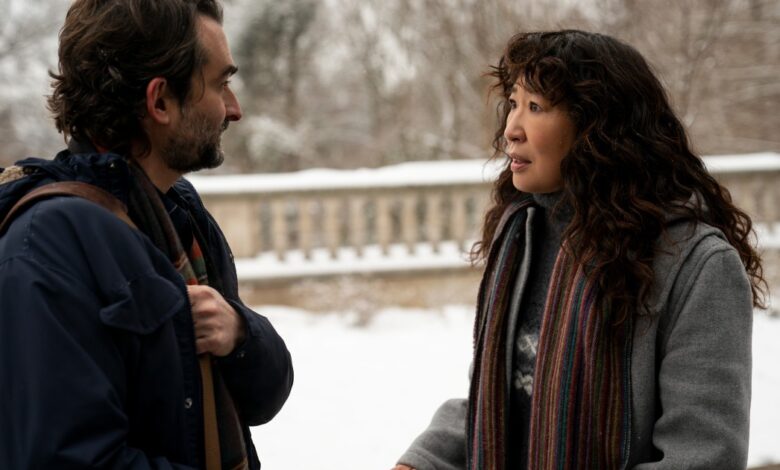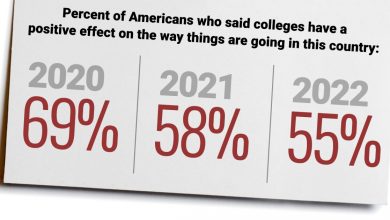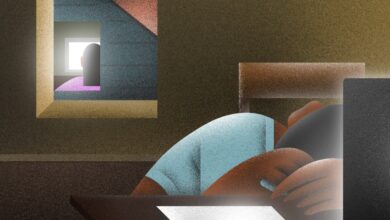Sandra Oh’s Character Defends Professional Literary Criticism

[ad_1]
You’re reading a recap of Episode 5 of the Netflix series The Chair with the writers Alison Kinney, Grace Lavery, Dan Sinykin, and Rebecca Wanzo. Find our other episode recaps here.
The following has been edited for length and clarity.
Rebecca: David Duchovny is so game in this episode. It reminds me of that hilarious turn of Keanu Reeves playing a narcissistic version of himself in Always Be My Maybe. Kudos to them for keeping his cameo under wraps and for the delightful sendup of institutions chasing celebrities.
Dan: The Duchovny bits are fantastic. He’s great playing himself as a presumptuous prick — and I love how his CV is true to life: Princeton, Yale, “The Schizophrenic Critique of Pure Reason in Beckett’s Early Novels.” I wish his thesis were available to read, but apparently one has to be on campus at Princeton to access it. His encounter with Ji-Yoon offers her a chance, which only we as the audience get to see, to take a stand for the discipline. She tells him that his thesis is an artifact of the past and that he has missed out on three decades of developments, that professional literary criticism is not a stage for dilettantes, that we have fields of knowledge built collectively through scholarship that demand to be taken seriously — an avowal that I’m not sure has ever been depicted in popular culture with this much earnestness.
Grace: The difference between now and 30 years ago, according to Ji-Yoon, is: “Affect theory, ecocriticism, digital humanities, new materialism, book history, developments in gender studies and critical race theory.” I wasn’t sure what I thought of that as an account of the last few decades, and I’m especially unsure why “developments in gender studies and critical race theory” is temporized differently than the rest of the list. Ji-Yoon wants us, the audience, to know that neither gender studies nor critical race theory was invented in the last 30 years, but by hiving them off into a different syntactic structure, and therefore into a different style of periodicity, I worry a little that there’s a sense that the current white panic around, for example, critical-race-studies-informed approaches to high-school curricula, remains unconfronted. A casual viewer of this show might come away thinking that universities these days are under threat from mobs of woke youth, rather than mobs of white supremacists like those that gathered on campuses in Charlottesville, Seattle, Berkeley, and elsewhere in 2017. The show’s framing of the university as a political entity dramatically overstates the risks of so-called “cancel culture,” and dramatically underestimates the risks of fascist agitation. I have no idea what the answer is, gah.
And guess what? You can get a PDF of “The Schizophrenic Critique of Pure Reason in Beckett’s Early Novels.” (Thanks to my spy at Princeton for having passed it on to me.) Much as I’d love to tear it to shreds, I have to say that I think it’s … genuinely pretty brilliant, for an undergraduate? I would certainly listen to the author of “The Schizophrenic Critique” talk about Beckett for a semester, if only to explore the tantalizing proposition that “there is nothing that Beckett does not believe in.”
Dan: Bill, meanwhile, fumbles his way, somehow, into the affection of the Korean community, despite his dramatic faux pas at Min-ji’s birthday party, where he is drunk and high on weed gummies and hydrocodone. He survives thanks to the caring supervision of Ju Ju. He is presented as the episode’s titular “last bus in town” for Ji-Yoon, but what a janky bus.
Alison: Agreed! I love how Min-ji’s party demonstrates the dynamic that’s been running through the whole show: Ju Ju is a little kid, yet she has to manage Bill, look out for him, direct him. (“Bill, it’s not time for cake yet!”) That’s the job of every woman of color, toward every white man, in this show.
Rebecca: That scene between Yaz and Elliot was painfully realistic. How many times have we heard someone say that a review won’t be taken seriously without negative comments? Constructive criticism and peer review are essential to our profession. But if someone is exemplary, it’s ridiculous that we can’t say so. Yaz had every right to be enraged with him. But the conversation between Yaz and Ji-Yoon is even more painful and realistic in depicting two friends and colleagues who feel betrayed by each other.
This goes back to the glass-cliff question. It’s not clear to me that anyone has ever tried to intervene in anything Elliot has done until Ji-Yoon, though the department has needed intervention for a long time. Ji-Yoon barely has the job for five seconds, and the dean puts pressure on her about enrollments and retirements, she has the first Black woman up for promotion, and also must deal with the longstanding effects of gender discrimination. This is just the everyday, without Bill’s crisis. Elliot was likely chair for a long time and untouchable. This is the all-too-familiar story of a department where there has been a cabal of people who have run it for a long time, and how women and people of color disrupt the status quo — but only so much.
Alison: I was struck by how these tensions play out in the classroom. Yaz tells Elliot that he isn’t a professor because “you don’t have any students.” This gets addressed so beautifully in the final episode, but I felt, watching the show up till now, that those of us who teach have been challenged to ask ourselves what our standards for good teaching are, what our commitments are, and whether we’re working hard enough to renew and re-examine them. I loved following the debates here on pedagogy and classroom engagement. Is it a good show — or a good roundtable — if it gets me wondering: What if I’m an Elliot? What if I’m a Bill? What if I’m a Yaz? I can’t be the only person who’s watching this and asking how I should improve my methods and commitments.
Grace: I appreciate this framing of the show’s pedagogical styles as nonhierarchical options. I worry that I’m an Elliot! Or, worse, a Duchovny …
This episode tries to offer an answer to the question I’ve been asking: What do we do? The conversation with David Duchovny is high stakes, too, because The Chair needs to distinguish between selling out to Hollywood, “content,” and clickbait on the one hand, and rejuvenating the profession with popular, Twitter-based engagement pedagogy on the other. The move, which is more than a bit sneaky, has been to align David Duchovny’s vapid ego-pedagogy with the olds, personified in Harold Bloom, with whom Duchovny has been associated in previous episodes. I’m skeptical of this as an argumentative move — I don’t think that those who seek to parachute vulgarians into positions of academic influence have much in common with the classicist “dinosaurs,” to use Elliot’s word. But as emplotment, it’s fairly satisfying. It allows us to believe that the bad guys are all kind of the same, even if (as we learn from the fractures here between Ji-Yoon and Yaz) the good guys have been factionalized.
[ad_2]
Source link







